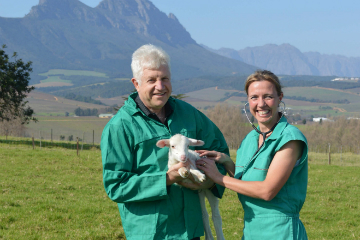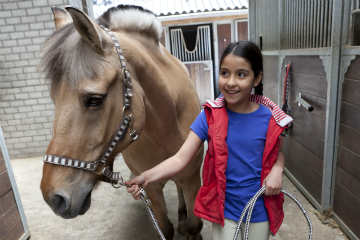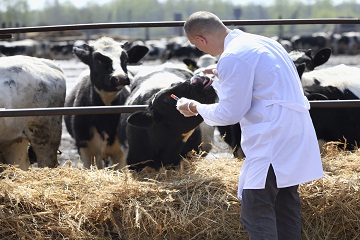World Veterinary Day 2015 - How to treat your pets
This is why veterinary professionals around the world work towards improving the lives of our pets.
World Veterinary Day takes place annually to celebrate the contribution made by veterinarians. The day was first celebrated in 2000, after being founded by the World Veterinary Association.
Healthcare services
Our provincial Department of Agriculture offers a variety of services for your pets and farm animals.
- Animal health: We monitor animal disease risks, prevent the spread of diseases by providing free tests, and control outbreaks of animal diseases.
- Export control: We provide control measures, including risk assessments and health certification. In addition, we assist with the export of products of animals.
- Food safety: We ensure that organisations follow proper animal slaughter hygiene standards.
- Veterinary laboratory services: We provide extensive healthcare services for livestock, poultry, ostrich and aquaculture industries.
Caring for your pets
From making sure that your home is pet ready to getting regular vaccinations, we spoke to state veterinarian Dr Annelie Cloete, about 7 ways to care for your pets based on the Five Freedoms of Animals.
- Animal shelter
It’s important to provide adequate shelter for your pets, especially as we approach winter. “Although animals have a coat that protects them from some adverse weather conditions, they need protection from exposure to the rain and cold weather during winter”.
- Vaccinations
Vaccination is the best way to protect your pets from disease, Dr Cloete said. She suggests at least two doses of a vaccine at two months and three months of age. “It works even better if a third dose is given at four months of age and thereafter yearly to every three years, as recommended by your veterinarian”.
- Car safety
If your pets do not enjoy travelling, you can buy medication from your vet to prevent anxiety or nausea during the trip. Dr Cloete suggests regular breaks, and using a travel cage and poop-scoop to ensure a pleasant journey.
 Medication
Medication
Some medicines can be deadly for your pets, “so only medication registered for a particular species can be used for that species.” You should visit your regular vet to get special care for your pets.
- Food and water
When feeding your pets, you should provide the best quality that you can afford, and protect your pets’ food. “Do not allow food to stay in the bowl for longer than 15 minutes after feeding,” said Dr Cloete. You should also disinfect their feeding bowls weekly.
- Identification
Dr Cloete advises pet owners to attach a name tag to their pets’ collar with a cellphone number. “If anyone finds your lost pet they can easily contact you”.
- Love and care
Spending quality time with your pets is an important part of their development. It’s also your responsibility to keep your pets safe from harm. “Proper fencing of a property to prevent dogs from running into the street, and training to stay inside when a gate is opened is essential”.
Animal cruelty
Animals, like humans, deserve love and care. Unfortunately many choose to inflict harm and suffering on animals who cannot protect themselves. The National Society for the Prevention of Cruelty to Animals (NSPCAs) describes animal neglect as:
- Starvation.
- Not providing water that leads to dehydration of the animal.
- Allowing parasite infestations to occur.
- A collar that has grown into the skin of a pet.
- Not providing adequate shelter for a pet.
- Failure to seek medical assistance in case of an emergency.
The Animal Protection Act 71 also promotes the well-being of animals. Some offences include:
- Starvation.
- Providing inadequate shelter and a collar that causes suffering.
- Exposing your pet to poison without taking precaution to prevent injury and disease.
- Keeping animals in an enviroment that infested with parasites.
- Attaching equipment to an animal that will cause injury.
- Laying a trap to capture an animal.
- Abandoning your animals.
- Breeds, posses, buys, sells, trains or imports animals for the purpose off fighting other animals.
According to the act, If you fail to care for your pets, you can:
- Lose ownership of your animals or the court can order for your pets to be destroyed if "it would be cruel to keep such an animal alive".
- Be declared unfit to own or be in charge of animals.
You can prevent animal cruelty by ensuring that you care for your pets, and reporting animal abuse to the NSPCA. You can also get involved by volunteering or making a donation to these organisations.
- Animal Anti-Cruelty League
- Animal Rescue Organisation
- Animal Rescue Team
- Animal Welfare Society of South Africa
- Bitou Horse Welfare
- Cape of Good Hope SPCA
- Cart Horse Protection Association
- Dassenberg Horse Rescue Centre
- Dyer Island Conservation Trust
- Fisantekraal Animal Welfare
- Kleinmond Animal Welfare Society
- Lucky Lucy Foundation
- Mdzananda Animal Clinic
-
Pet Empowerment in Townships (PETS)

- Plett Animal Welfare Service (PAWS)
- The South African Foundation for the Conservation of Coastal Birds (SANCCOB)
- Tears Animal Rescue
- The People's Dispensary for Sick Animals (SA)
- The Underdog Project
- Township Animal Rescue
- Uitsig Animal Rescue Centre
- White Shark Trust
More information
Remember, you can get information about veterinary services and information from the Western Cape Department of Agriculture.



